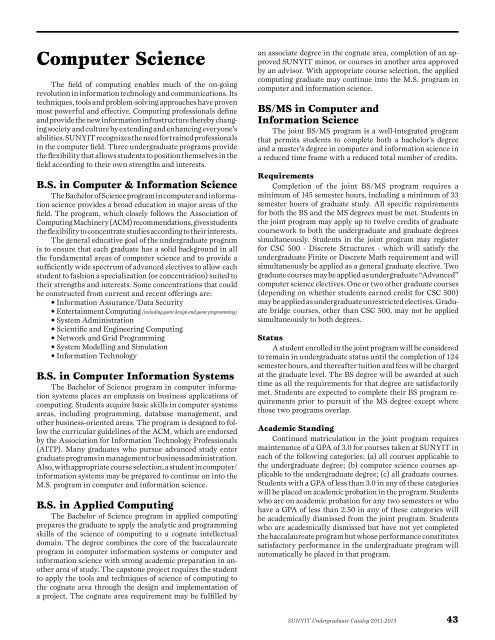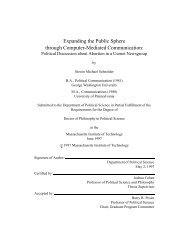Undergraduate Catalog 2011-2013 - SUNY Institute of Technology
Undergraduate Catalog 2011-2013 - SUNY Institute of Technology
Undergraduate Catalog 2011-2013 - SUNY Institute of Technology
You also want an ePaper? Increase the reach of your titles
YUMPU automatically turns print PDFs into web optimized ePapers that Google loves.
Computer Science<br />
The field <strong>of</strong> computing enables much <strong>of</strong> the on-going<br />
revolution in information technology and communications. Its<br />
techniques, tools and problem-solving approaches have proven<br />
most powerful and effective. Computing pr<strong>of</strong>essionals define<br />
and provide the new information infrastructure thereby changing<br />
society and culture by extending and enhancing everyone’s<br />
abilities. <strong>SUNY</strong>IT recognizes the need for trained pr<strong>of</strong>essionals<br />
in the computer field. Three undergraduate programs provide<br />
the flexibility that allows students to position themselves in the<br />
field according to their own strengths and interests.<br />
B.S. in Computer & Information Science<br />
The Bachelor <strong>of</strong> Science program in computer and information<br />
science provides a broad education in major areas <strong>of</strong> the<br />
field. The program, which closely follows the Association <strong>of</strong><br />
Computing Machinery (ACM) recommendations, gives students<br />
the flexibility to concentrate studies according to their interests.<br />
The general educative goal <strong>of</strong> the undergraduate program<br />
is to ensure that each graduate has a solid background in all<br />
the fundamental areas <strong>of</strong> computer science and to provide a<br />
sufficiently wide spectrum <strong>of</strong> advanced electives to allow each<br />
student to fashion a specialization (or concentration) suited to<br />
their strengths and interests. Some concentrations that could<br />
be constructed from current and recent <strong>of</strong>ferings are:<br />
• Information Assurance/Data Security<br />
• Entertainment Computing (including game design and game programming)<br />
• System Administration<br />
• Scientific and Engineering Computing<br />
• Network and Grid Programming<br />
• System Modelling and Simulation<br />
• Information <strong>Technology</strong><br />
B.S. in Computer Information Systems<br />
The Bachelor <strong>of</strong> Science program in computer information<br />
systems places an emphasis on business applications <strong>of</strong><br />
computing. Students acquire basic skills in computer systems<br />
areas, including programming, database management, and<br />
other business-oriented areas. The program is designed to follow<br />
the curricular guidelines <strong>of</strong> the ACM, which are endorsed<br />
by the Association for Information <strong>Technology</strong> Pr<strong>of</strong>essionals<br />
(AITP). Many graduates who pursue advanced study enter<br />
graduate programs in management or business administration.<br />
Also, with appropriate course selection, a student in computer/<br />
information systems may be prepared to continue on into the<br />
M.S. program in computer and information science.<br />
B.S. in Applied Computing<br />
The Bachelor <strong>of</strong> Science program in applied computing<br />
prepares the graduate to apply the analytic and programming<br />
skills <strong>of</strong> the science <strong>of</strong> computing to a cognate intellectual<br />
domain. The degree combines the core <strong>of</strong> the baccalaureate<br />
program in computer information systems or computer and<br />
information science with strong academic preparation in another<br />
area <strong>of</strong> study. The capstone project requires the student<br />
to apply the tools and techniques <strong>of</strong> science <strong>of</strong> computing to<br />
the cognate area through the design and implementation <strong>of</strong><br />
a project. The cognate area requirement may be fulfilled by<br />
an associate degree in the cognate area, completion <strong>of</strong> an approved<br />
<strong>SUNY</strong>IT minor, or courses in another area approved<br />
by an advisor. With appropriate course selection, the applied<br />
computing graduate may continue into the M.S. program in<br />
computer and information science.<br />
BS/MS in Computer and<br />
Information Science<br />
The joint BS/MS program is a well-integrated program<br />
that permits students to complete both a bachelor’s degree<br />
and a master’s degree in computer and information science in<br />
a reduced time frame with a reduced total number <strong>of</strong> credits.<br />
Requirements<br />
Completion <strong>of</strong> the joint BS/MS program requires a<br />
minimum <strong>of</strong> 145 semester hours, including a minimum <strong>of</strong> 33<br />
semester hours <strong>of</strong> graduate study. All specific requirements<br />
for both the BS and the MS degrees must be met. Students in<br />
the joint program may apply up to twelve credits <strong>of</strong> graduate<br />
coursework to both the undergraduate and graduate degrees<br />
simultaneously. Students in the joint program may register<br />
for CSC 500 - Discrete Structures - which will satisfy the<br />
undergraduate Finite or Discrete Math requirement and will<br />
simultaneously be applied as a general graduate elective. Two<br />
graduate courses may be applied as undergraduate “Advanced”<br />
computer science electives. One or two other graduate courses<br />
(depending on whether students earned credit for CSC 500)<br />
may be applied as undergraduate unrestricted electives. Graduate<br />
bridge courses, other than CSC 500, may not be applied<br />
simultaneously to both degrees.<br />
Status<br />
A student enrolled in the joint program will be considered<br />
to remain in undergraduate status until the completion <strong>of</strong> 124<br />
semester hours, and thereafter tuition and fees will be charged<br />
at the graduate level. The BS degree will be awarded at such<br />
time as all the requirements for that degree are satisfactorily<br />
met. Students are expected to complete their BS program requirements<br />
prior to pursuit <strong>of</strong> the MS degree except where<br />
those two programs overlap.<br />
Academic Standing<br />
Continued matriculation in the joint program requires<br />
maintenance <strong>of</strong> a GPA <strong>of</strong> 3.0 for courses taken at <strong>SUNY</strong>IT in<br />
each <strong>of</strong> the following categories: (a) all courses applicable to<br />
the undergraduate degree; (b) computer science courses applicable<br />
to the undergraduate degree; (c) all graduate courses.<br />
Students with a GPA <strong>of</strong> less than 3.0 in any <strong>of</strong> these categories<br />
will be placed on academic probation in the program. Students<br />
who are on academic probation for any two semesters or who<br />
have a GPA <strong>of</strong> less than 2.50 in any <strong>of</strong> these categories will<br />
be academically dismissed from the joint program. Students<br />
who are academically dismissed but have not yet completed<br />
the baccalaureate program but whose performance constitutes<br />
satisfactory performance in the undergraduate program will<br />
automatically be placed in that program.<br />
<strong>SUNY</strong>IT <strong>Undergraduate</strong> <strong>Catalog</strong> <strong>2011</strong>-<strong>2013</strong> 43
















